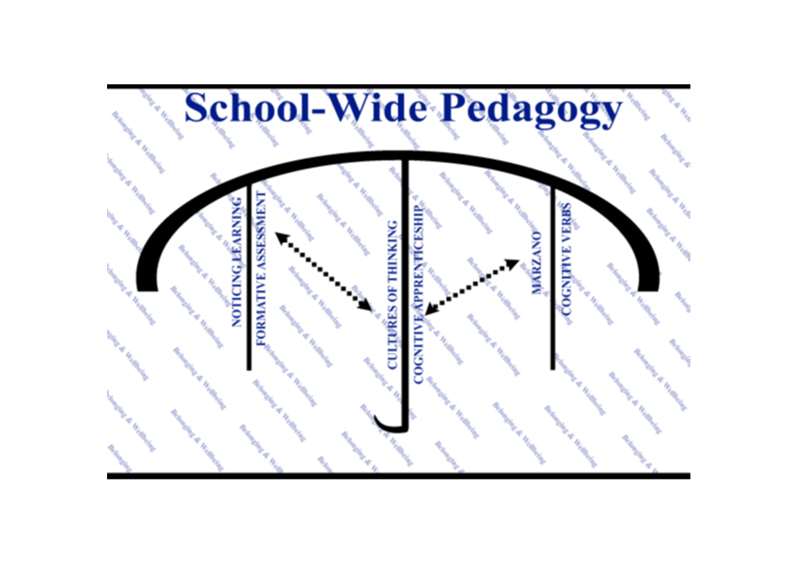The Model Unpacked
Noticing Learning: The School participated in a two-year research project with ACU’s Institute for Learning Science and Teacher Education to help formulate its approach to assessment specifically at Year 7. The aim of noticing learning is to help decouple assessment and anxiety by utilising various elements of formative assessment practice in tandem with reduced assessment loads. The results were published in 2021 in the Oxford Review of Education.
Cultures of Thinking: Cultures of Thinking is an approach to teaching and learning emanating from Harvard University’s long-standing Project Zero research. It refers specifically to the eight cultural forces underscoring classroom practice. These are: expectations, language, time, modelling, opportunities, routines, interactions, and environment.
Cognitive Apprenticeship: This involves teachers seeing themselves as coaches of developing expertise in their subjects rather than just didactic conveyors of concepts and information. As Professor Guy Claxton (2021) has written:
‘…education should be in the business of “developing the capacity to hold the emotional tension of mental complexity”—and that means crafting a curriculum (and approaches to teaching and learning) that not only informs young people explicitly and accurately about wicked problems but also relentlessly stretches and strengthens their capacity to meet such complexity with minds that are calm, balanced, open, subtle and acute. Filling their heads with unquestioned verities of yesteryear, is not, on its own, going to achieve that’ (pg. 60).
Cognitive Verbs (Marzano): Cognitive verbs (cognitions) form a very important component of the assessment culture underscoring Queensland’s unique approach to internal and external assessment. These are deeply embedded in both the Queensland Curriculum and Assessment Authority’s (QCAA) Instrument-specific marking guides (ISMGs) and external assessment marking guides (EAMGs). These cognitions are embedded deeply into our teaching and learning practices.
Open Doors: This is the School’s model of professional review. Open Doors works as a three-year model:
- Focus Area 1: Curriculum Focused Pedagogy (how we teach)
- Focus Area 2: Relationships and “Being known” (who we teach)
- Focus Area 3: Open Doors as collaborative practice (our visible thinking culture).
The model was designed by our staff for our staff and is currently in the second year of the 2021 to 2023 iteration.
Pre-Service Teachers: For many years the School has been an active supporter of pre-service teacher education working very closely with a number of Universities across Queensland and interstate. Quite a number of staff started their careers as BGGS pre-service teachers.
Staff Conferences: A staff conference is held at the beginning of each academic year. The conception of the annual staff conference is an important function of the Centre for School Wide Pedagogy as it helps to lay the foundations for staff learning and development in a given academic year.
As University of Queensland scholar Dr Peter Ellerton notes:
‘…the importance of critical thinking to innovation, employability, participatory democracy, and countering widespread misinformation is widely accepted, and so the means in which it is developed and the educational environments that are constructed to do this are a cause if immediate and significant concern’ (pg 1).
References
Adie, L. Addison, B. & Lingard, B. (2021): Assessment and learning: an in-depth analysis of change in one school’s assessment culture, Oxford Review of Education.
Claxton, G. (2021). The Future of Teaching and the Myths that Hold it Back, Routledge.
Crowther, F. Andrews, D. & Conway, J. (2013). School Wide Pedagogy: Vibrant New Meaning for Teachers and Principals. Hawker Brownlow.
Ellerton, P. (2021). On Critical Thinking and Content Knowledge: A Critique of the Assumptions of Cognitive Load Theory. Thinking Skills and Creativity, 17 November 2021.
Marzano, R. & Kendall, J. (2007). The New Taxonomy of Educational Objectives, Corwin.
Ritchhart, R. (2015). Creating Cultures of Thinking: The 8 Forces We Must Master to Truly Transform Our Schools. Jossey-Bass.
Ritchhart, R. & Perkins, D.N. (2005). Learning to think: The challenges of teaching thinking. The Cambridge handbook of thinking and reasoning 775-802
Stobart, G. (2014). The Expert Learner: Challenging the Myth of Ability, Open University Press.
van Manen, M 1991, The tact of the teaching: the meaning of pedagogical thoughtfulness, Suny Press.


